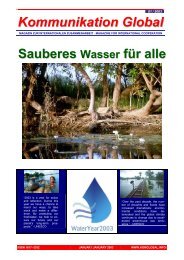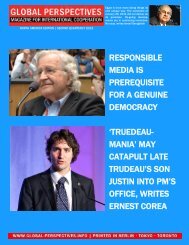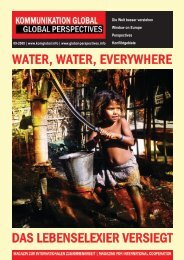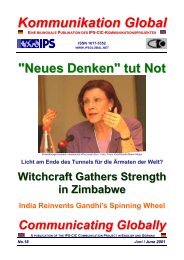GLOBAL PERSPECTIVES | KOMMUNIKATION GLOBAL - 01 | 2009
GLOBAL PERSPECTIVES | KOMMUNIKATION GLOBAL - 01 | 2009
GLOBAL PERSPECTIVES | KOMMUNIKATION GLOBAL - 01 | 2009
Create successful ePaper yourself
Turn your PDF publications into a flip-book with our unique Google optimized e-Paper software.
COUNTDOWN TO COPENHAGEN<br />
Tosi often has to work from nine in the morning till 2 o’clock in the night. He can not attend all the meetings that are scheduled.<br />
Industrialized countries have over 20 delegates present at the conference and have the advantage of dividing the work and<br />
knowledge. Congo can not…<br />
Less represented as these developing countries are, they are fighting for proposals on combating and adapting to climate<br />
change, but unfortunately these are completely ignored by the developed countries. Let’s hope that during the week the negotiations<br />
will lead to something more constructive.<br />
Day 4, December 9: Politics in Warsaw<br />
At the same time the climate conference in Poznan is taking place, the European Union is gathered in Brussels to negotiate on<br />
their climate and energy package for the coming years. The results of this meeting will influence the outcomes of the UN conference<br />
on climate change to a big extent. If the EU will not come forward as a leader in the climate negotiations because they<br />
have not resolved their internal disputes, it will be unlikely that ambitious plans will be made in Poznan. That’s why today we<br />
leave Poznan and take the train to Warsaw, where prime ministers Merkel (Germany) and Tusk (Poland) – who are blocking the<br />
negotiations on the climate and energy package – are meeting to discuss climate change We join a demonstration in front of the<br />
presidential building to show that we find it very important that agreement on climate action is reached in Brussels and Poznan.<br />
Ben Wikler, who organized the demonstration, explains: “the negotiations in the EU affect the negotiations at the UN, and the<br />
negotiations at the UN determine humanity’s response to climate change. The decisions they make today affect the entire<br />
world”. He believes the world leaders have an opportunity to get the world cheering, by investing in clean solutions and the<br />
creation of green jobs. If they don’t do it, they are destroying their international reputation for years to come.<br />
ICCO'S FairClimate Ambassadors<br />
Day 5, December 10: Meeting our minister<br />
Jacqueline Cramer, the Dutch minister of the environment is also present in Poznan. Today we had the chance to meet her at<br />
the exhibition hall of the conference. Together we get a tour of innovative projects and energy solutions for the future. We<br />
even go for a dance with her to generate energy in the sustainable dance booth of Dutch danceclub Watt. We also interview her<br />
about statements and expectations of the conference. She says her main points are “to convince industrialized countries to cut<br />
in their emissions, and to assist developing countries that already experience the effects of climate change – such as droughts,<br />
floods and sea level rise – by providing money and knowledge for adaptation”. When asking what advice she would give the<br />
world on climate change, she states “the financial crisis is no excuse to put the climate crisis in the fridge!” We are glad she<br />
takes this point of view and hope she is able to convince the other developed countries of the importance to act now.<br />
Day 6, December 11: High level statements?<br />
Today the environmental ministers of over 190 countries arrived in Poznan to make their statements at the high level segment<br />
of the conference. Although some of the speeches are truly inspirational – such as the one by the minister of the environment of<br />
Denmark, encouraging world leaders to get serious about the need for a fair and effective Kyoto Protocol follow-up in Copenhagen<br />
next year – most of them are predictable or even boring. When listening to them, we get the feeling these speeches are<br />
little more than empty statements and we sincerely hope they get some real work done, so that the conference in Poznań can<br />
be reviewed as a successful milestone on the road to Copenhagen.<br />
Day 7, December 12: Wrapping up<br />
The impasse between developed and developing countries remains. Developed countries stress that they do not want to commit<br />
themselves to high emission reductions unless the developing countries (including booming countries such as China and India)<br />
agree on reductions as well. On the other hand, developing countries maintain their viewpoint that the industrialized world<br />
should take leadership and make efforts, since they are the ones who are historically (and currently for the greatest part) responsible<br />
for climate change. The EU does not take up its position as leader, but – after quarrelling internally on the energy and<br />
climate package – comes forward with a weakened proposal. The main outcome of the climate conference in Poznan is that<br />
more meetings are necessary. We are hugely disappointed and can only hope for and try to influence a more successful outcome<br />
of the conference in Copenhagen next year. But, as an inhabitant of Tuvalu so strikingly put: “we may not be around then anymore…”<br />
<strong>GLOBAL</strong> <strong>PERSPECTIVES</strong> �<br />
<strong>GLOBAL</strong> <strong>PERSPECTIVES</strong> | JANUARY <strong>2009</strong> 27















